CIVIL SOCIETY WATCH 9-13 May
This week: SA lawyer to receive Calgary Peace Prize, International day for the argan tree and series of talks on land occupations
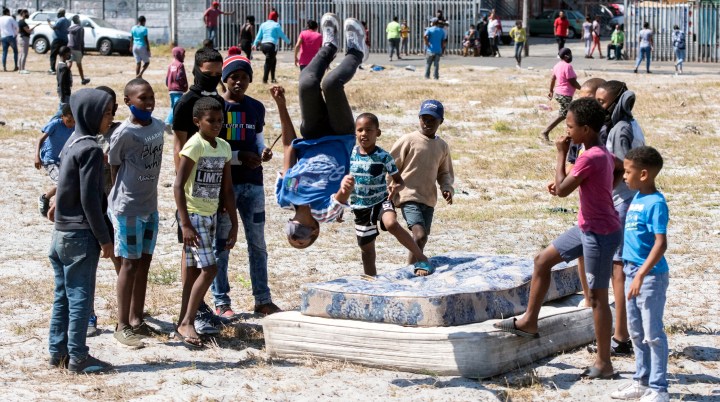
The Psychological Society of South Africa is hosting a workshop on sexual consent among young adults; the Law Trust Chair in Social Justice in the Faculty of Law at Stellenbosch University is holding an expert roundtable on social justice, economic inclusion and immigration.
Tuesday, 10 May is the International Day of Argania. The argan tree (Argania spinosa) is native to the sub-Saharan region of Morocco, according to the United Nations (UN) information page on the event. It is a “fundamental pillar for sustainable development”.
“The argan tree is typically a multipurpose tree that supports income generation, increases resilience and improves climate adaptation, playing a very important role in achieving the three dimensions of sustainable development – economic, social and environmental – at the local level,” according to the UN.
One of the products derived from the tree is argan oil, which is extracted from the seeds and has multiple applications. It is valued in traditional and complementary medicine, as well as in the culinary and cosmetic industries.
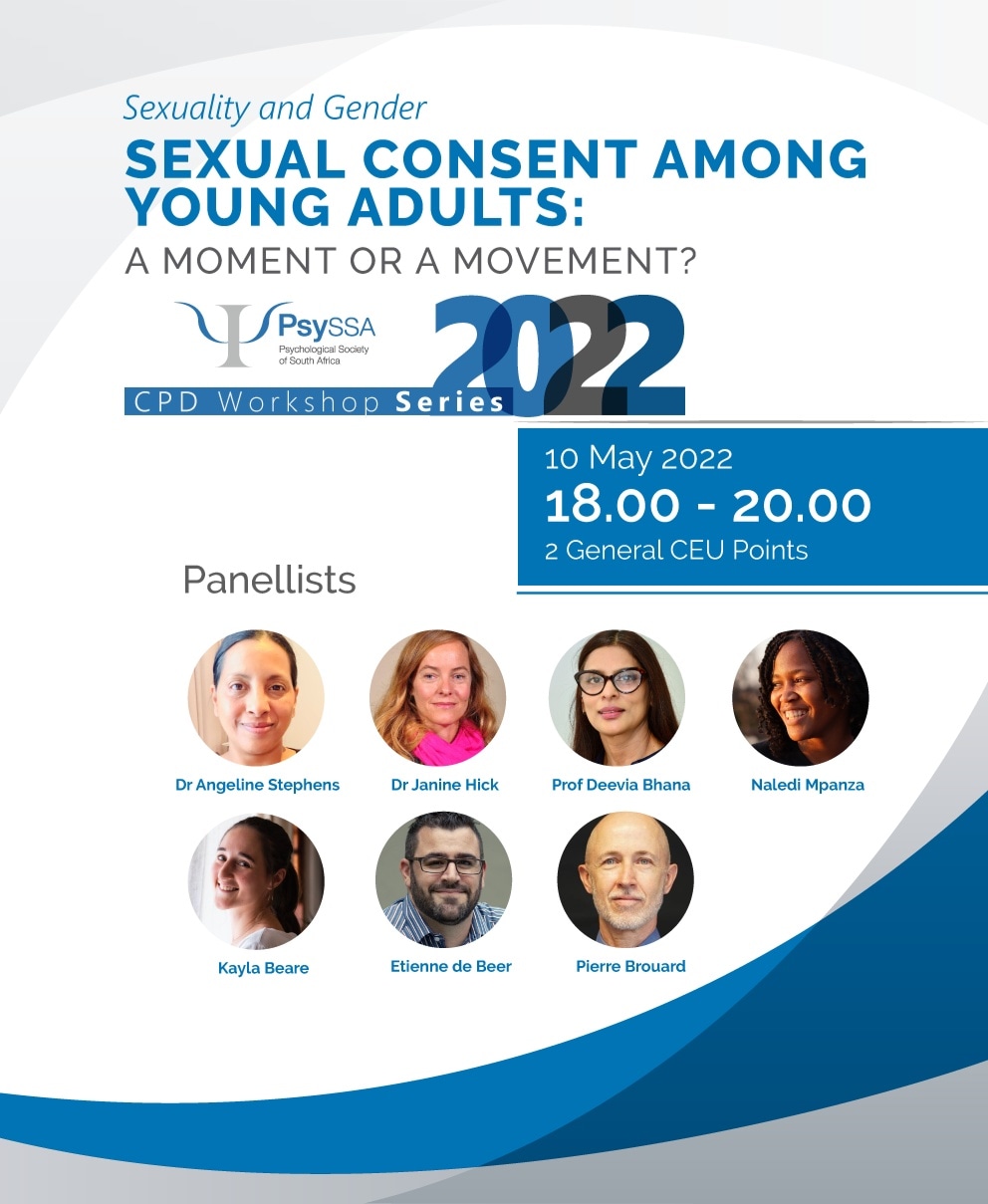
On Tuesday, 10 May at 6pm, the Psychological Society of South Africa (PsySSA) will host a workshop on “Sexual consent among young adults: a moment or a movement?” – the first in a series of such events.
“Within the legal framework in South Africa, sexual consent means voluntary or unforced agreement between parties of a legal age, to engage in sexual activity,” according to the event description.
“While the narrative around sexual consent among young adults tends to emphasise ongoing, explicit, enthusiastic and verbal consent at all stages of an encounter, social and cultural scripts have produced a codification of language that reflects the intersections of identity, gender, sexuality and power.”
The workshop seeks to explore the notion of consent not only as something that happens at a pivotal moment in a romantic or sexual encounter, but also as something that occurs in the language of a social movement which explores the role of gender, power and sexual and youth cultures.
Among the panellists are Dr Angeline Stephens, Dr Janine Hick and Professor Deevia Bhana.
Register here.
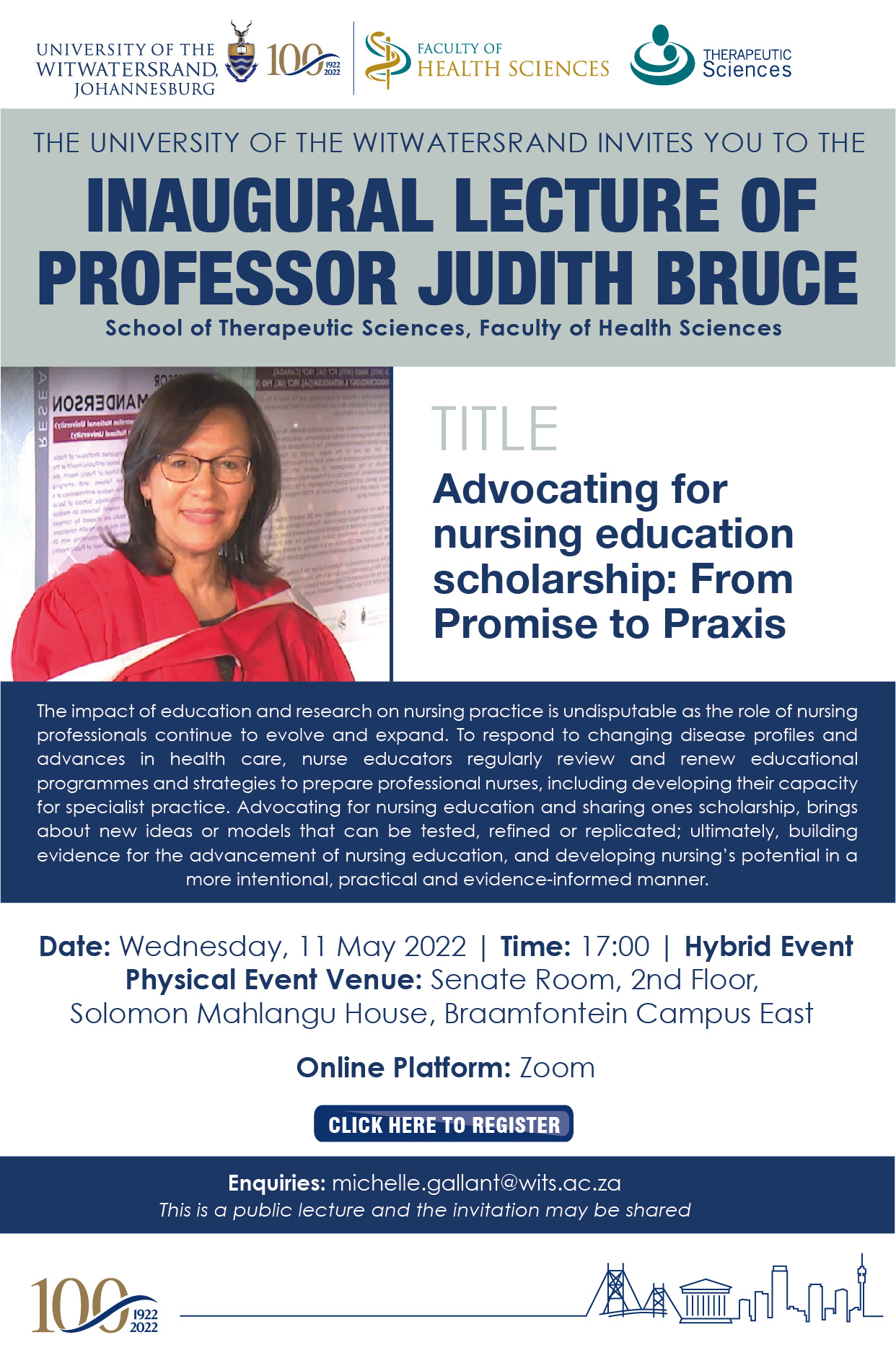
On Wednesday, 11 May at 5pm, Professor Judith Bruce will deliver an inauguration lecture on “Advocating for nursing education scholarship: From Promise to Praxis”. Bruce is part of the School of Therapeutic Sciences in the Faculty of Health Sciences at the University of the Witwatersrand.
Education and research have an important impact on nursing practice, according to the event description. As such, nurse educators regularly review and renew educational programmes and strategies to prepare professional nurses.
“Advocating for nursing education and sharing one’s scholarship brings about new ideas or models that can be tested, refined or replicated, ultimately building evidence for the advancement of nursing education, and developing nursing’s potential in a more intentional, practical and evidence-informed manner,” it says.
Register here.
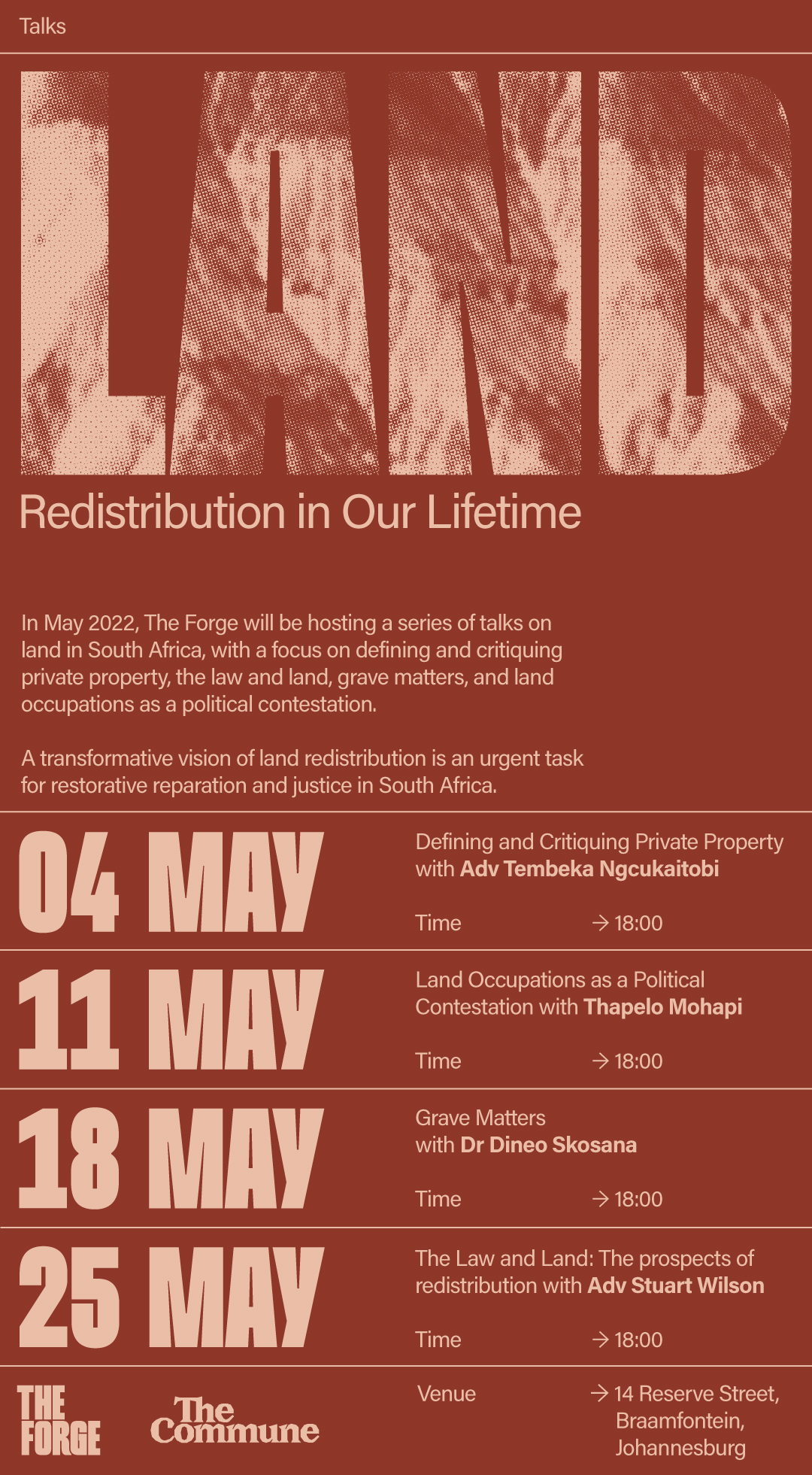
On Wednesday at 6pm, the Forge will host a talk on “Land Occupations as a Political Contestation” with Thapelo Mohapi of Abahlali baseMjondolo, at 14 Reserve Street, Braamfontein, Johannesburg.
The event is part of a series of talks on land in South Africa, organised by the Forge, exploring law and land, grave matters, and defining and critiquing private property, among other topics.
“A transformative vision of land redistribution is an urgent task for restorative reparation and justice in South Africa,” says the event description.
Thursday, 12 May is the International Day of Plant Health. Both our health and the health of the planet depend on plants, according to the Food and Agriculture Organization of the United Nations. Plants make up 80% of the food we eat and produce 98% of the oxygen we breathe. Despite this, they are under threat.
“Up to 40% of food crops are lost due to plant pests and diseases every year. This is affecting both food security and agriculture, the main source of income for vulnerable rural communities,” according to the UN.
“Climate change and human activities are altering ecosystems and damaging biodiversity while creating new niches for pests to thrive. International travel and trade, which has tripled in volume in the last decade, is also spreading pests and diseases. We need to protect plants both for people and the planet, and all of us have a role to play.”
The International Day of Plant Health is intended to raise global awareness of how protecting plant health can help reduce poverty, end hunger, protect biodiversity and boost economic development.
On Thursday, 12 May at 9am, the Law Trust Chair in Social Justice in the Faculty of Law at Stellenbosch University will host an expert roundtable on “Social Justice, Economic Inclusion and Immigration: Exploring the social justice dimensions of polarising nationalism and xenophobia concerning employment and informal sector opportunities”.
The event will run until 5pm, involving three panel discussions on:
- Exploring the historic, current and future immigration policy of South Africa and the implementation thereof, as well as its effectiveness in achieving a socially just purpose;
- Critically analysing the legal and economic dimensions of foreign workers in South Africa and internationally, with a focus on the effect on business opportunities and employment within the informal sector;
- Identifying the nature and consequences of xenophobia through a social justice lens, and exploring the triggers, causes and solutions to rising violence against foreigners arising from xenophobic sentiment among discontented South Africans.
“The broad objective of the event is to explore the social justice implications of a historic and recent resurgence in discontent toward foreigners in South Africa, immigration policy, utilisation of business opportunities and employment in the formal and informal sectors of the economy. The secondary aim is to explore the nature of xenophobia through a social justice-anchored human rights lens,” according to the event description.
Professor Thuli Madonsela, the Law Trust Chair in Social Justice at Stellenbosch University, is programme director for the event.
Register to attend virtually here. Register to attend in-person here.
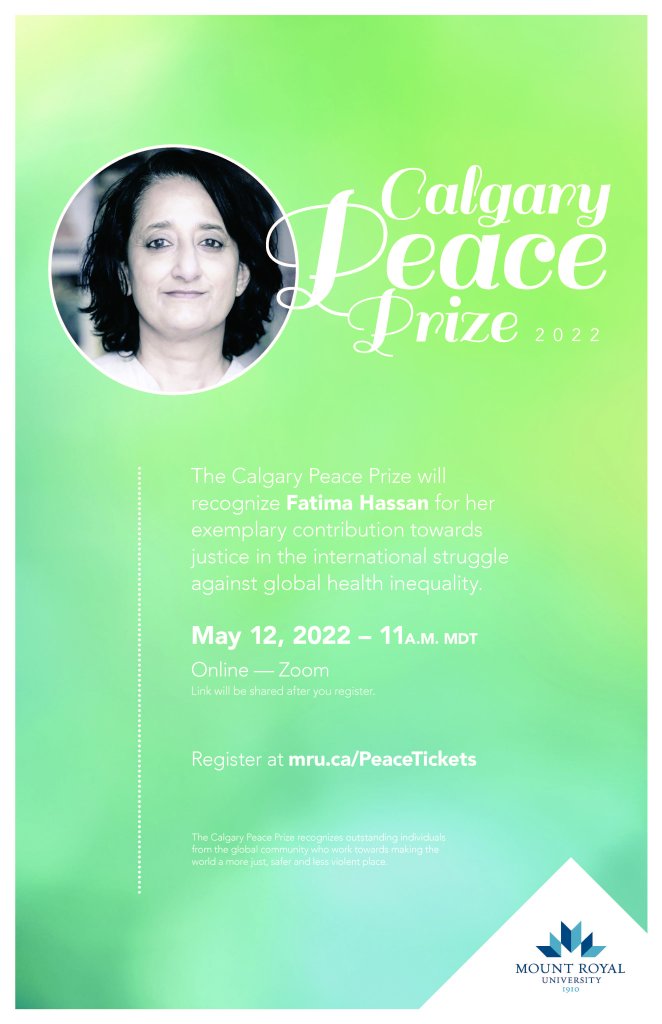
On Thursday at 11am, Mount Royal University will recognise Fatima Hassan – human rights lawyer, social justice activist and the founder of the Health Justice Initiative – for her contribution to justice in the international struggle against global health inequality. She will receive the 2022 Calgary Peace Prize.
Hassan will give a talk on global health inequality, racism and the legacies of colonialism, “specifically focusing on the pressing problem of global Covid-19 vaccine inequality”.
She will continue the discussion with a panel including Dr Mark Ayyash, associate professor in the Department of Sociology and Anthropology at Mount Royal University; Priti Krishtel, co-founder and co-executive director of I-MAK; Dr Madhu Pai, Canada research chair in translational epidemiology and global health and associate director of the McGill International TB Centre at McGill University; and Siva Thambisetty, associate professor of law in the LSE Law School at the London School of Economics and Political Science.
Register here.
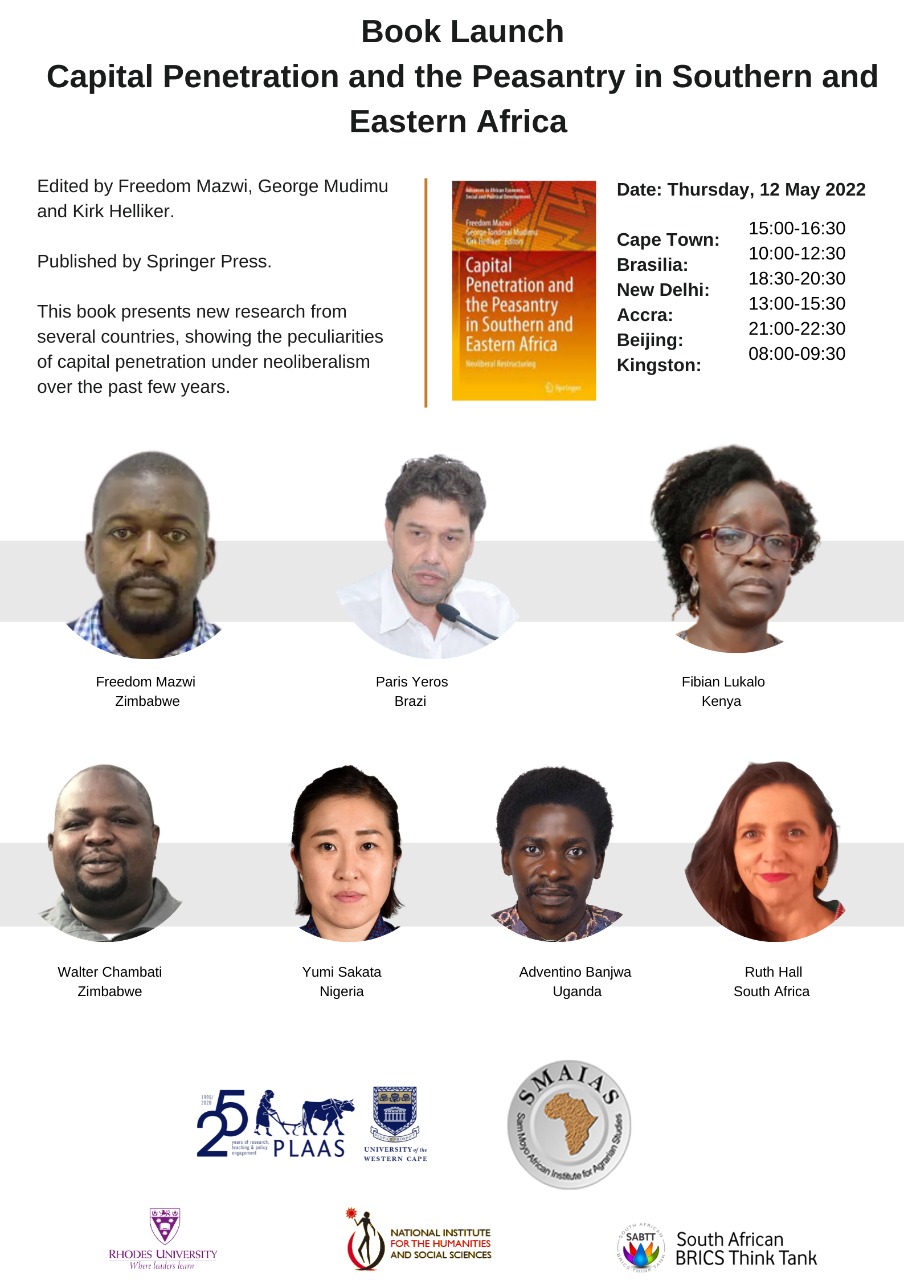
On Thursday at 3pm, the Sam Moyo African Institute for Agrarian Studies (SMAIAS), in partnership with the Institute for Poverty, Land and Agrarian Studies (Plaas), will host a book launch for Capital Penetration and the Peasantry in Southern and Eastern Africa: Neoliberal Restructuring (Springer Press). The editors of the book are Freedom Mazwi, George Mudimu and Kirk Helliker.
The webinar description reads: “Neoliberal capitalism has diverse impacts on the peasantry. This book presents new research from several countries, showing the peculiarities of capital penetration under neoliberalism over the past few years.
“Shifting policies on input and output markets have undermined food self-sufficiency as extroverted production gathers momentum at the expense of the production of staple grains for national markets. Additionally, capital penetration driven by neoliberalism has stalled land reforms and led to land concentration, landlessness, and hunger.”
Speakers include Adventino Banjwa, PhD fellow at the Makerere Institute of Social Research at Makerere University, Uganda; Dr Yumi Sakata, research associate at SMAIAS, Zimbabwe; Dr Fibian Lukalo, director of research and advocacy at the National Land Commission in Kenya; and Professor Paris Yeros of the faculties of economic sciences, sciences and humanities and world political economy at the Federal University of ABC in Brazil.
The moderator will be Dr Walter Chambati of SMAIAS, while the respondent will be Professor Ruth Hall of Plaas.
Register here.
On Friday, 13 May, the Department of Basic Education, in partnership with the LEGO Foundation, will host a “Results and Impact” event based on the outcomes of the Early Childhood Development Census 2021.
Minister of Basic Education Angie Motshekga will deliver the keynote address, which will be followed by a panel discussion on the outcomes and implications for early childhood learning through play in South Africa, moderated by Jo-Ann Strauss, the Unicef goodwill ambassador and a businesswoman. DM/MC
[hearken id=”daily-maverick/9472″]



















 Become an Insider
Become an Insider
Comments - Please login in order to comment.